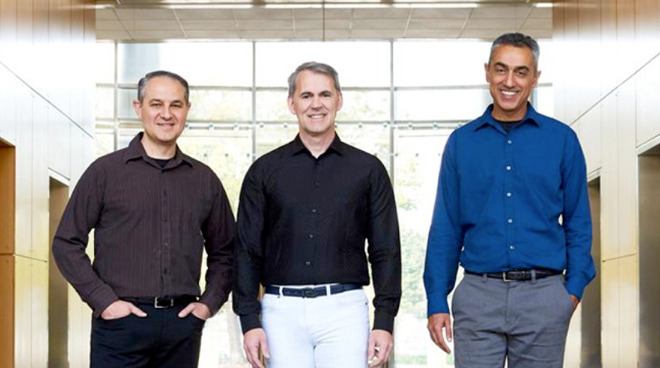Former iPhone chip designer hits back at Apple for anticompetitive practices
As the legal battle wears on, former Apple engineer Gerard Williams III now claims Apple has been headhunting employees at Nuvia as part of an anticompetitive campaign against him.

Nuvia co-founders, L-R: John Bruno, Gerard Williams III, and Manu Gulati
In December of 2019, Apple sought to sue Gerard Williams III, former iPhone and iPad processor designer, for breach of contract. The suit asserted that Williams began his new company, Nuvia, while still working for Apple, and also accuses him of recruiting his former colleagues.
The specific claims in the suit claimed that "by 2018, Williams had started his new venture on Apple's dime." Apple said Williams told colleagues his new firm would develop technology that Apple "would have no choice but to purchase."
Williams had filed a counter argument, a "notice of demurrer" in the same court. The document referred to multiple sections of Apple's suit which Williams sought to have stricken.
The court, however, allowed it to continue, and rejected Williams' claim. The judge went on to clarify that California law does not allow an employee "to plan and prepare to create a competitive enterprise prior to termination if the employee does so on their employer's time and with the employer's resources."
Williams is now claiming that Apple has launched their own anticompetitive campaign against him, according to court documents provided to AppleInsider by Nuvia. He claims that Apple had threatened Nuvia to not recruit Apple engineers, then had attempted to hire away Nuvia co-founder John Bruno.
He also reiterated that he had waited until he left Apple before starting Nuvia, despite Apple's allegations that he'd started the company while still employed by Apple. His case argues that Apple's actions threaten employee rights, such as the right to mobility and the right to invent independent of your employer.
It's not clear if the case will see trial or not. A judge has dismissed Apple's request for punitive damages as they'd failed to show how Williams had harmed the company by being disloyal.

Nuvia co-founders, L-R: John Bruno, Gerard Williams III, and Manu Gulati
In December of 2019, Apple sought to sue Gerard Williams III, former iPhone and iPad processor designer, for breach of contract. The suit asserted that Williams began his new company, Nuvia, while still working for Apple, and also accuses him of recruiting his former colleagues.
The specific claims in the suit claimed that "by 2018, Williams had started his new venture on Apple's dime." Apple said Williams told colleagues his new firm would develop technology that Apple "would have no choice but to purchase."
Williams had filed a counter argument, a "notice of demurrer" in the same court. The document referred to multiple sections of Apple's suit which Williams sought to have stricken.
The court, however, allowed it to continue, and rejected Williams' claim. The judge went on to clarify that California law does not allow an employee "to plan and prepare to create a competitive enterprise prior to termination if the employee does so on their employer's time and with the employer's resources."
Williams is now claiming that Apple has launched their own anticompetitive campaign against him, according to court documents provided to AppleInsider by Nuvia. He claims that Apple had threatened Nuvia to not recruit Apple engineers, then had attempted to hire away Nuvia co-founder John Bruno.
He also reiterated that he had waited until he left Apple before starting Nuvia, despite Apple's allegations that he'd started the company while still employed by Apple. His case argues that Apple's actions threaten employee rights, such as the right to mobility and the right to invent independent of your employer.
It's not clear if the case will see trial or not. A judge has dismissed Apple's request for punitive damages as they'd failed to show how Williams had harmed the company by being disloyal.

Comments
i guess we will know the true story once this suit has played out.
I worked at McDonals once so I guess I can never open a burger joint?
seriously
Ah! My mistake.
- His attempts to block Apple from using his company phone's text messages as evidence failed. That was always going to fail and it doesn't look good that he tried
- If Williams did create private IP while still employed by Apple, even outside of work hours, then Apple may have a claim to it
- If William's planned and even started a competitor while employed at Apple that's even worse for his case, and it risks destabilising his other claims
- The clauses raised aren't anti-competitive, and as far as employment contracts go they're a standard way of answering the obvious questions about ownership of IP
On one hand we can see that non-compete clauses are difficult to enforce for numerous well-founded reasons. I.E. The stipulation that a person must wait X-months before being employed in a similar capacity.
However I would be very surprised if IP/competitive businesses made during employment will find such difficulty, since the matter is clean-cut about ownership and responsibilities.
This law may have come about due to Calif law that says companies can not enforce a non competes with employees. I an employee wants to leave to do their own thing they have to do it on their one time then.